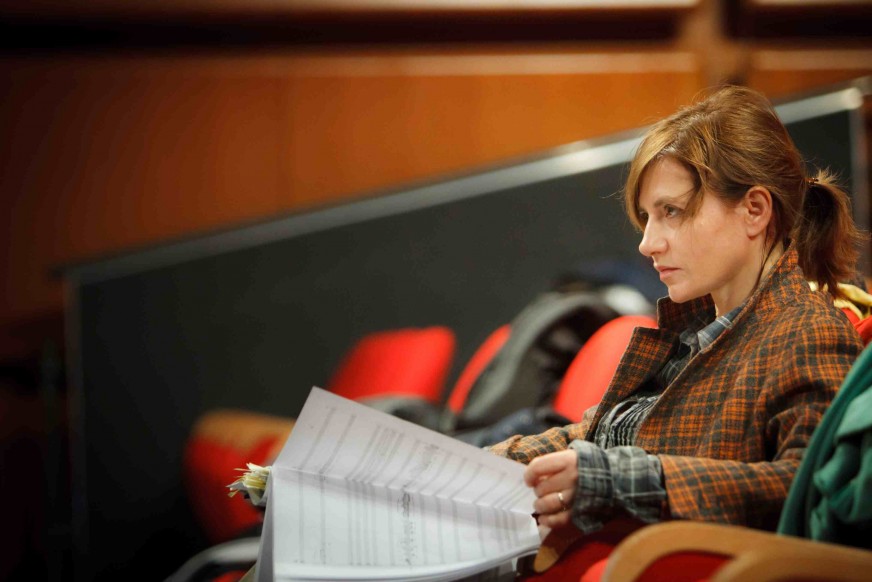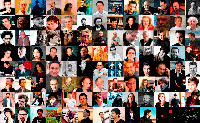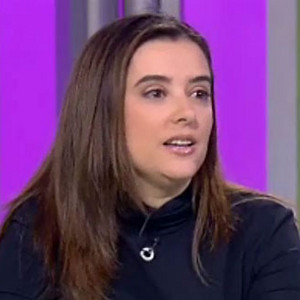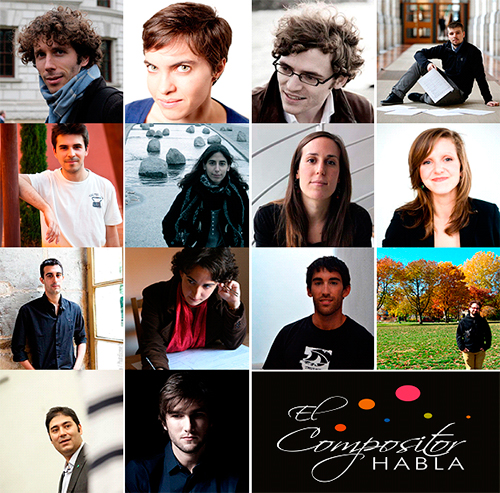Artistas
Lucia Ronchetti (Compositora)
Lucia Ronchetti | Interview with Lucia Ronchetti
21/12/2018She is one of the most consistently creative, amaze and genuine voices of the contemporary scene and undoubtedly a composer worth following. She has just released her work «action music pieces» performed by the Ensemble intercontemporain, conducted by Matthias Pintscher and edited by the KAIROS label of which we speak to you in our Christmas Special . I have talked to her and this is what she told us.

1. Ruth Prieto: Who is Lucia Ronchetti and which characteristic defines you best?
Lucia Ronchetti: I feel to be more a worker than an artist. I spend more than eight hours every day working on my score, starting from early morning. It’s a total dedication to something incredibly difficult for me, writing music, which requires solitude, silence and concentration.
2. R.P.: What is your DNA as a composer?
Lucia Ronchetti: I am always involved in projects of music theatre, in concert form too, or for a very small ensemble. Each of my projects is related to extra-musical resources and I keep searching for a theatrical dimension, which could be expressed by the sound itself and through the inner ritual of the performance.
3. R.P.: What inspires you as an artist and why?
Lucia Ronchetti: I am a reader, and I am surrounded by readers, friends suggesting me what to read and also reading for me, and this generates many projects; actually more that I could ever imagine to realize in form of score.
4. R.P.: What are your musical roots (real or imaginary)?
Lucia Ronchetti: I have had a very long classical formation, having studied imitating many musical written styles, starting from early music and focusing especially on Palestrina, Monteverdi, Gesualdo and Verdi. So I am deeply influenced by these kind of "Italian" musical roots.
5. R.P.: In this personal "inventory" that we all have of noises, sounds, music and songs, what can you tell us about your soundscape?
Lucia Ronchetti: I continuously imagine soundscapes. During the many hours I spend on my desk every day, I am captured by sound conglomerates that I try to transform into written music. Most of time without a real success: they are too beautiful and ghostly to become pages of score, but I keep trying it. They are nebulous entities, complex oceans of metamorphic and coloured sound.
6. R.P.: ¿What does silence sound like?
Lucia Ronchetti: Silence never occurs in my mind. In my reality, the appearance of silence always shows a subliminal and delicate sound presence. I spent all my youth studying in very old Roman libraries and I learnt that silence does not exist: the environment (the libraries their selves and the palaces, especially the old Roman palaces) always produce subtle complex sounds and have an inner acoustic harmony.
7. R.P.: ¿Have you got a composer of reference or someone who made a special impression on you as an artist?
Lucia Ronchetti: The strongest impression I have had, was listening to "Aura" by Bruno Maderna when I was sixteen. That listening led me to the decision of becoming a composer. But other times I was extremely impressed: once in Paris, during the 1980’s, attending the performance of Laborinus II with Luciano Berio at the mixer; recently in Darmstadt attending the performance of Koma, opera by Georg Friedrich Haas and librettist Händl Klaus.
8. R.P.: Have you got any key composers in contemporary music scene? Any advice, suggestion, discovery?
Lucia Ronchetti: My teachers, Sylvano Bussotti, Salvatore Sciarrino, Gérard Grisey and Tristan Murail are still for me very important and influential composers.
9. R.P.: Can you define contemporary? And, in which way Lucia Ronchetti is contemporary?
Lucia Ronchetti: I am not "contemporary", my music is a completely free to walk through the stratifications of music history; my compositional palette includes every technique and timbre resource of the past and the present: sometimes it is hard also for me to understand my position on the contemporary music scene...
 10. R.P.: What is your main obsession as a composer when working?
10. R.P.: What is your main obsession as a composer when working?Lucia Ronchetti: To capture in my pages my sound imagination.
11. R.P.: How do you go about putting together a new work, could you describe your creative process?
Lucia Ronchetti: I work very hard and for a very long time on the dramaturgical project, sometimes alone, if I can manage it, sometimes with people helping me. Then I start to develop musical structures in relation with the dramaturgy, searching for every resource a musician can offer, from his performing technique to his presence and possibility of acting or playing on different plans of performance.
12. R.P.: ¿How do you see the contemporary music scene today?
Lucia Ronchetti: Very wide and appealing, completely free, fertile, growing in new ideas and tendencies, a paradise!
13. R.P.: ¿What has your greatest extravagance been?
Lucia Ronchetti: Maybe inserting some long bed sheets into the piano braces, to be fastly moved by three percussionists surrounding the piano, in order to generate the sound of white immobile snow for the Palais du silence, produced by the Ensemble Intercontemporain. The effect was incredibly interesting but the way to get it really rude and, so to say, “provincial”. I remember the producer, Josephine Markovits, telling me: “How is it possible that each time you are here, a Neapolitan road market comes together with you?”
14. R.P.: ¿What would you like to do as an artist that you have not been asked to do yet?
Lucia Ronchetti: A giant choral opera with only voices: children, women, men and very old and not professional voices, an apocalyptic vocal fresco.
15. R.P.: We have the idea, probably very old, of what a concert is: people playing and people listening. How do you imagine “concerts” in the XXI century?
Lucia Ronchetti: For me the concert is in itself a theatrical ritual and the performers today are evolving and feel to be much more than musicians reading a score. They are involved in a complex visual and acoustical project, producing impressions and memories on the public, more than ever in the past.
16. R.P.: Is it difficult to perform avant-garde projects in these time of crisis?
Lucia Ronchetti: No, not at all, since ever artists and composers have been able to realize their works also with much reduced budgets and in situations of limited production possibilities. We are in time of crisis but very ambitious projects are realized indeed. Many opera houses are programming and producing new operas. During the next year there will be premieres by Chaya Czernowin at the Deutsche Oper Berlin, Olga Neuwirth at the Wiener Staatsoper, and Beat Furrer at the Staatsoper Berlin, among others!
17. R.P.: What are you working on now?
Lucia Ronchetti: A big opera for the Frankfurt Opera based on Dante's Inferno, which make me so proud and so happy.
18. R.P.: In September Kairos has released you cd «action music pieces», what could you tell us about this work?
Lucia Ronchetti: It is the representation of my doing music theater everywhere with big or reduced resources; working in Freiburg, Rome, Paris and Firenze. It is also the testimony of some professional friendships who have enriched my life, with people like percussionist Christian Dierstein, or cellist Michele Marco Rossi.
19. R.P.: ¿What are your next projects?
Lucia Ronchetti: I have just had the first Italian performance of my chamber opera Le Avventure di Pinocchio in Rome, produced by the Opera di Roma and the Romaeuropa festival with the Ensemble Intercontemporain, featuring fantastic artists, like Juliette Allen, Jilles Durot, Eric-Maria Couturier, Diego Tosi, Nicholas Crosse, Jens Mac Manama and Nicolas Berteloot and I will have a new production of the choral opera Inedia prodigiosa at the Nouvelle Philharmonie in Paris, on February 3rd, 2019, with the fantastic French choir Sequenza 9.3 conducted by Catherine Simonpietri .
Lucia's photographs by Stefano Corso courtesy of the composer
More information on the composer's website Lucia Ronchetti
Destacamos ...
Nueva Sección Directorio
dedicada a la promoción de compositores, intérpretes, instituciones y editoriales.

dedicada a la promoción de compositores, intérpretes, instituciones y editoriales.



